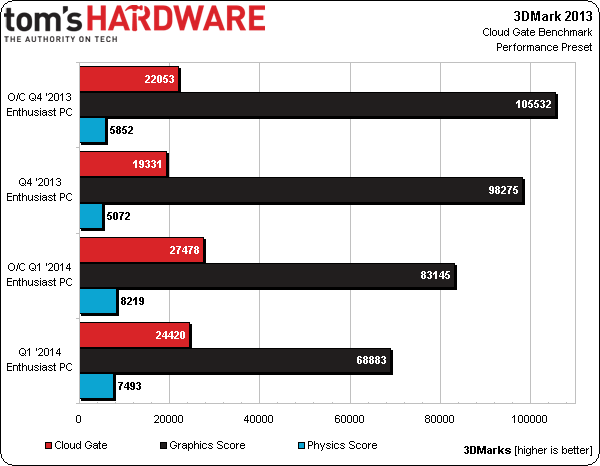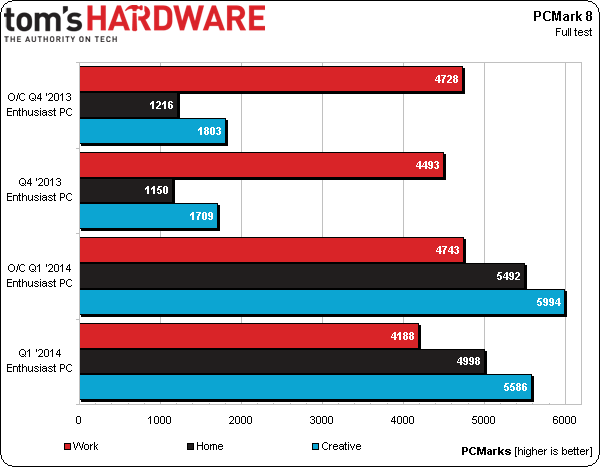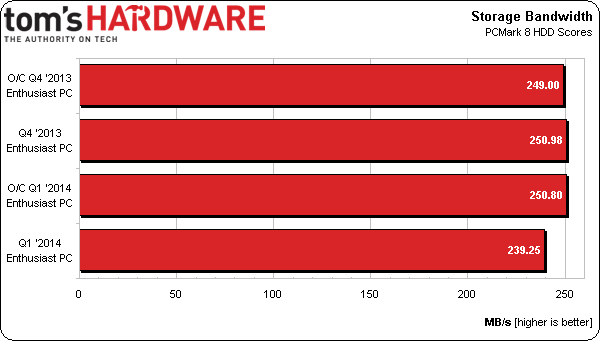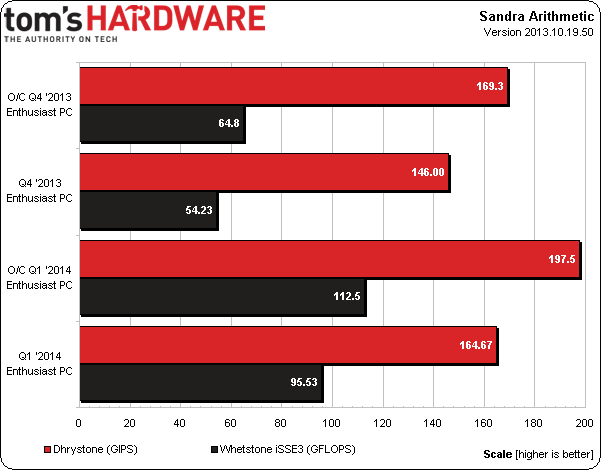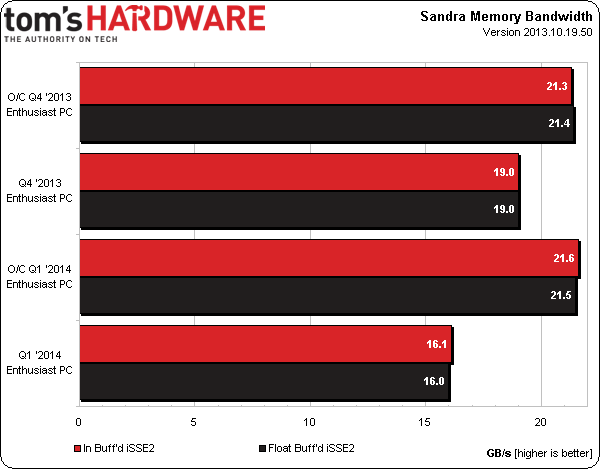System Builder Marathon, Q1 2014: Our New Enthusiast PC
Results: Synthetics
We begin our benchmark analysis with the synthetics, which should pinpoint the biggest differences between this quarter's and last quarter's System Builder Marathon setups. There's the Core i7 against the Core i5, and the GeForce GTX 780 Ti against the 770s in SLI.
Processor-oriented tests able to exploit Hyper-Threading should demonstrate gains on the new system. Meanwhile, games designed to tax GPUs could go either way, depending on optimizations for Nvidia's multi-GPU technology.
The Cloud Gate test result (in red) favors the single GeForce GTX 780 Ti over our previous SLI setup. This could be considered surprising, given how much higher those 770s score in the Graphics component. But because our Core i7-4770K features Hyper-Threading, allowing it to excel in the Physics test, Futuremark appears to weigh that functionality more heavily.
In PCMark, the Core i7 clearly enjoys a huge advantage in the Home and Creative benchmark tests, while the work result barely changes between systems. As far as storage is concerned, the fast SSDs achieve almost identical scores.
The Core i7-4770K shows up the previous build's Core i5-4670K when it comes to Sandra's Arithmetic module, which obviously takes advantage of as many logical cores as it can.
With the new build defaulting to 1333 MT/s memory settings, bandwidth appears disappointingly low until the XMP memory profile is instantiated. This will likely have a detrimental impact on any memory-dependent benchmarks in our test suite.
Current page: Results: Synthetics
Prev Page Test System And Benchmarks Next Page Results: Media TranscodingGet Tom's Hardware's best news and in-depth reviews, straight to your inbox.
Don Woligroski was a former senior hardware editor for Tom's Hardware. He has covered a wide range of PC hardware topics, including CPUs, GPUs, system building, and emerging technologies.
-
envy14tpe Why a Galaxy GPU considering the company pulled out of US market? btw, nice work on the build.Reply -
bemused_fred I wish more builds would account for the cost of the OS. It can be a significant expense, especially when you're working with builds of $600 or less.Reply -
Dark Oopa wow, I didn't think there would be such a little difference in gaming.In fact, the difference is so small that with all the inherent problems of the SLI, the new rig is always the better choice.Reply -
redgarl Multi-gpu problems are always overly exagerated. I am using multi-gpu platforms for almost 5 years and the gain in fps over the UNOTICEABLE and overly exagerated stutering sweep away any disavantages.Folks, don't lure yourself, higher resolution demand multi-gpus. Single card is fine for anything around 1080p, more or less, but at 4K or 3 1080p monitors... your system is going to choke even with a 780 ti.Reply -
npyrhone Having 1600x900 resolution in the gaming charts serves only one purpose: to create the impression that there is not really a difference between the two builds, while in reality the later one is obviously inferior to the previous one.Reply -
vertexx It's a shame to completely remove the non-core components from the competition, but I understand why it's done here. A couple of ideas to throw out there:Reply
(1) You could include temperatures and acoustics performance in the overall assessment, given I think that is a big part of the case buying decision, and
(2) A way to factor in the intangibles (i.e. blu ray vs dvd, choice of SSD/HDD, etc), you could include a separate vote between this quarter's and last quarter's to see what the readers would choose for the best build given all the performance factors, aesthetics, and other components that do not contribute directly to performance. The reader's vote of this quarter vs. last quarter and/or an overall value winner for this quarter could be included in the final write-up.
I would also 2nd the vote for starting 4K testing. And also, why not 1440p? It seems those two resolutions are more relevant now in 2014 at the level of this competition than 1600x900 and 4800x900 resolutions. -
DarkSable I'm sorry, Tom's, but...You really need to stop misinforming the general public who comes here for your articles and doesn't read the forums in depth.You go with an i7 for the "performance benefits," which are nonexistent for gaming... except that this rig is aimed at gaming. I would have much, much rather seen an i5, with a note explaining that an i7 is a good upgrade if you're doing these sorts of things, but isn't helpful if you're building a gaming computer.There are wayyyy too many new builders out there who think that the i7 is better than the i5 and who are just wasting their money, and you aren't helping them or correcting that misinformation - rather, you're just reinforcing it further.Reply -
nekromobo I would really like to see mATX and mini-itx versions of this article, pretty please :)Reply -
vertexx Reply
Hmm.... What percentage of the performance measures in this article are for gaming?12959893 said:I'm sorry, Tom's, but...You really need to stop misinforming the general public who comes here for your articles and doesn't read the forums in depth.You go with an i7 for the "performance benefits," which are nonexistent for gaming... except that this rig is aimed at gaming. I would have much, much rather seen an i5, with a note explaining that an i7 is a good upgrade if you're doing these sorts of things, but isn't helpful if you're building a gaming computer.There are wayyyy too many new builders out there who think that the i7 is better than the i5 and who are just wasting their money, and you aren't helping them or correcting that misinformation - rather, you're just reinforcing it further.

